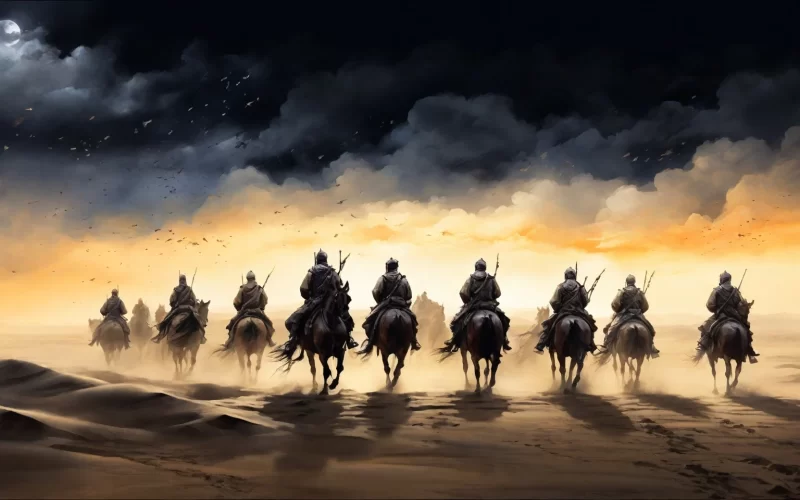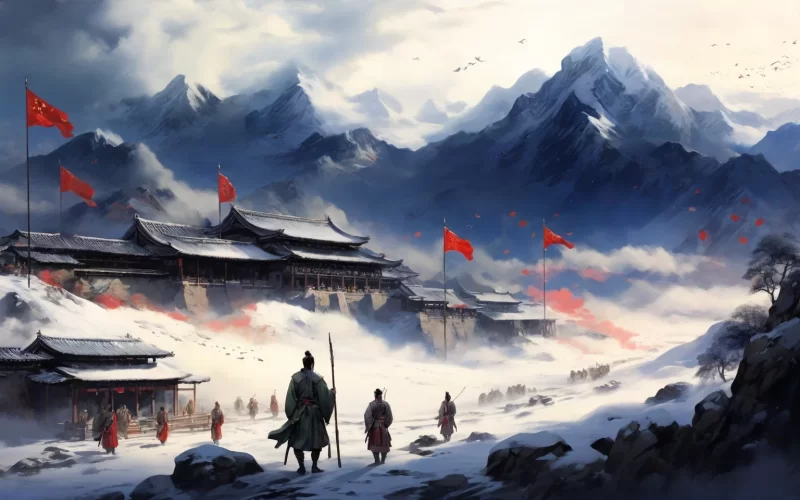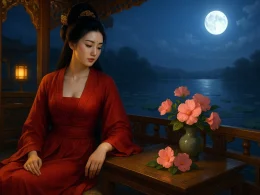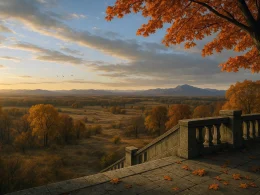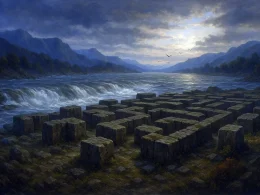The wind and sand in the desert have dimmed sunlight;
With red flags half unfurled we go through the camp gate.
North of River Tao, after nocturnal fight,
Our vanguards have captured the chief of hostile State.
Original Poem:
「从军行 · 其五」
王昌龄
大漠风尘日色昏,红旗半卷出辕门。
前军夜战洮河北,已报生擒吐谷浑。
Interpretation:
This poem is written by Wang Changling, a frontier poet of the Tang dynasty, depicting the mood and battle situations of the soldiers stationed at the frontier upon hearing the news of victory from the front lines. Through this poem, Wang Changling reflects the strength and morale of the Tang army, showcasing the intensity of border battles and the heroic spirit of the soldiers. By describing the battle from the side, the poet effectively conveys the tense atmosphere of military action.
First Couplet: “大漠风尘日色昏,红旗半卷出辕门。”
(In the vast desert, the wind and sand obscure the sky, and a dim, twilight-like gloom envelops the surroundings. The red flag is half-rolled as the army prepares to march out of the camp.)
This couplet illustrates the harsh environment of the desert as the Tang army sets out for battle. The image of the sandstorm not only intensifies the tension of the setting but also symbolizes the impending fierce battle. The half-rolled red flag signifies the speed and determination of the army, suggesting that a battle is about to take place. Through this dynamic imagery, the poet skillfully sets the stage for the tense tone that will carry through the rest of the poem.
Second Couplet: “前军夜战洮河北,已报生擒吐谷浑。”
(The vanguard engages in a night battle north of the Tao River, and the victory report arrives, announcing the capture of the leader of the Tuyuhun.)
This couplet introduces a sudden shift, offering the exciting news of the vanguard’s triumph. By briefly describing the night battle, the poet focuses on the swift delivery of the victory message, emphasizing the strength and speed of the Tang army. Although the poem does not directly describe the battle, the phrase “已报生擒吐谷浑” conveys the inevitable victory of the Tang army, enhancing the emotional impact of the poem.
Writing Features:
- Clever Use of Indirect Description: Wang Changling does not directly describe the fierce night battle but instead conveys the tense atmosphere and quick victory through the juxtaposition of the two couplets. This approach breaks away from the traditional direct narrative style and enhances the poem's artistry.
- Dynamic and Atmospheric Imagery: The first couplet, with the phrase “大漠风尘日色昏,” creates a vivid sense of the harsh environment and tension, forming a powerful visual impact. The second couplet, with “已报生擒吐谷浑,” conveys the victory news, creating a strong contrast that intensifies the dramatic effect of the poem.
- Concise and Forceful Expression: Wang Changling conveys a complex battle scene and emotional conflict in just four succinct lines. Every detail in the poem is full of power, especially the imagery of "红旗半卷" and "已报生擒吐谷浑," which symbolize the swift momentum and invincibility of the Tang army.
Overall Appreciation:
This poem portrays the tense atmosphere of frontier battles and the formidable combat strength of the Tang army with concise brushstrokes. Instead of directly describing the battle, the poet skillfully uses environmental descriptions and the delivery of victory news to display the Tang army's invincible spirit. This indirect approach not only avoids flat, straightforward description but also adds dramatic intensity, making the poem both compact and emotionally impactful. Through these delicate depictions, Wang Changling successfully conveys the magnificent scenes of the frontier and the heroic spirit of the soldiers.
Poem translator:
Xu Yuan-chong (许渊冲)
About the poet:

Wang Changling (王昌龄), circa A.D. 690 - 756, was a native of Xi'an, Shaanxi Province. Wang Changling's poems were mostly about the Border Places, love affairs and farewells, and he was well known during his lifetime. His seven poems are equal to those of Li Bai, and he is known as the “Master of seven lines”.






